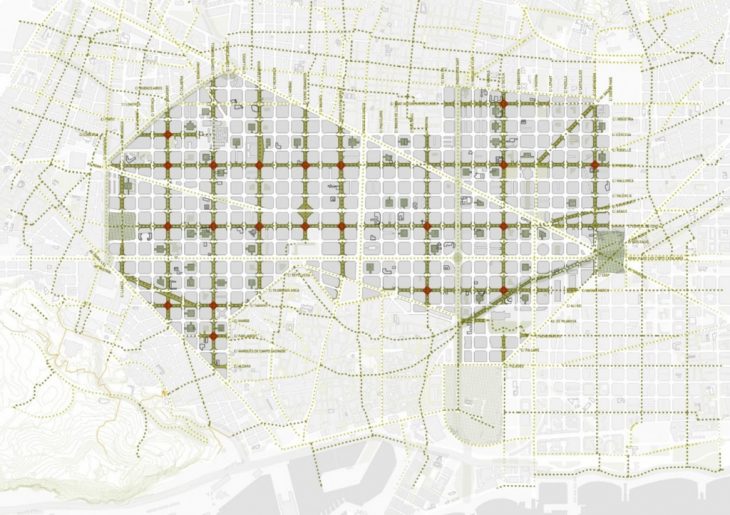Master in City & Technology 2020/21 – Term II
Studio Name: Internet of People
Total Hours: 50 hours
Faculty: Luis Falcon
Faculty Assistant: Iacopo Neri
Abstract
The studio will face a revision of the new ambitious post-COVID proposal of Barcelona city council: the new extension of Superblock concept all over l’Example district. Participants are challenged to reinforce this plan beyond capitalist system as we know it . A wide international perspective on sustainability scapes, working with citizens and contemporaries’ communities as center, must trigger a bulk of ideas that review policies behind the municipal plan.
Six (6) main local challenges will be addressed by six teams to be organized. Data will fuel a critical approach to the plan. Each team will choose a challenge from which they will have to redraw, substitute or justify a support to the current urban plan.

Eixample district, the new Barcelona superblock as an expansion of the existing car-free spaces in the city. Ajuntament de Barcelona .
Context & Agenda
Artificial Intelligence is for the Digital Industry what the Assembly Chain was for the Fordist one. The automation of data processing is disrupting the ways industries, companies and people unfold on cities . While private agents are speeding up digital processes focused on improving their product or services, post-COVID strategies of the most advanced cities are facing an urban transformation where people’s participation, digital transformation, bio-security and sustainable agendas are becoming a key factor. People’s participation is understood here as the capacity of citizens to take part of a decentralized process of decision making.
Urban policies on the digital age are primary based on the design of Processes. These processes might evolve all agents in the urban decision making. Furthermore, they should be able to adapt rapidly to changes or mistakes on previous decisions. Cities behave as an organism and their development and set of rules should integrate the same level of dynamism that contemporary events push them up.
These events to come on the next months and years drawn a scenario where instability, volatility and uncertainty will gradually disappear, points out Santiago Niño-Becerra. The regulation established from the technologies for identifying situations and people in real time, as Minority Repot anticipated, as the digital traces that each individual leaves on a daily basis, will redefine concepts such as freedom, privacy and intimacy. They will disappear as technologies expand. In return, security will be provided to the whole, thanks to the establishment of regulatory measures that will remind the individual capacities to act. A new system will start from efficiency, excellence and productivity as a leitmotiv. Technology and robotization will be deployed in all areas. Large corporations will have increasingly visible importance. The idea of individuality will disappear as a regulation dynamic enters. In the new model, personal skills will lead the training of people with high capacities, which will be exploited through plans supported by projects.
Throughout 2030, technology, in any of its manifestations: Artificial Intelligence, robotics, neural networks, quantum computers … will be a daily reality. Private property will have no practical sense, so payment for access to use will be the usual formula to dispose of goods and services. Acting in a sustainable way will be the norm, ceasing to be considered a cost. Small and medium-sized businesses will either disappear, or become satellites of corporations. And the craftsmen, understood as a professional, will be recognized for dedicating himself to developing valuable products. Capitalist individual freedom will cease to make sense because the reference will become the common and collective good understood as a whole.

‘Social Event’. Elijah Munn, Linara Salikhova, Rovianne Santiago, Michelle Rodríguez. Internet of People Studio. 2020.
Site: Barcelona
The studio will be focused on the city of Barcelona. The final proposal will mainly be framed by l’Example Superblock municipal proposal.
Faculty

Luis Falcón Martínez de Marañón has a Master in Strategic Planning from the Berlage Institute – TU Delf University of Technology, Rotterdam, Netherlands (2001), a degree in Architecture and Urban Planning from the University of Las Palmas de Gran Canaria – ULPGC, Spain (1997). He is Co-Founder and CEO of the ICT company inAtlas (www.inAtlas.com), specialized on Big Data and Location Analytics. He has been Director at Intelligent Coast, an Urban Consultancy and Strategic Planning specialized on tourist destinations, for 13 years. Luis Falcón has been Member of the Sectorial Commission of Knowledge and Strategy of the Tourism Table of the Generalitat of Catalonia. He is also Member of the Advisory Board of Tourism Campus of the Girona University. He is guest professor and part of the Faculty of ‘Master in City & Technology’ at the Institute for Advanced Architecture of Catalonia, IaaC

Iacopo Neri’s research lies at the intersection between architecture, computer science and urban planning. He holds a Master of Science in Architecture with Distinction at The Polytechnic University of Milan, and attended a Master in City and Technology at the Institute for Advanced Architecture of Catalonia (IaaC, Spain) after presenting a paper about Swarm Intelligences for crowd-based analysis during the Responsive Cities Symposium (2017, Barcelona). He has been involved as a teaching assistant since 2015 at the University of Florence, later, at The Polytechnic University of Milan, and finally at IAAC where he is currently part of the City and Technology computational research team. He also works as a computational designer at External Reference Architecture Bureau, Barcelona.
